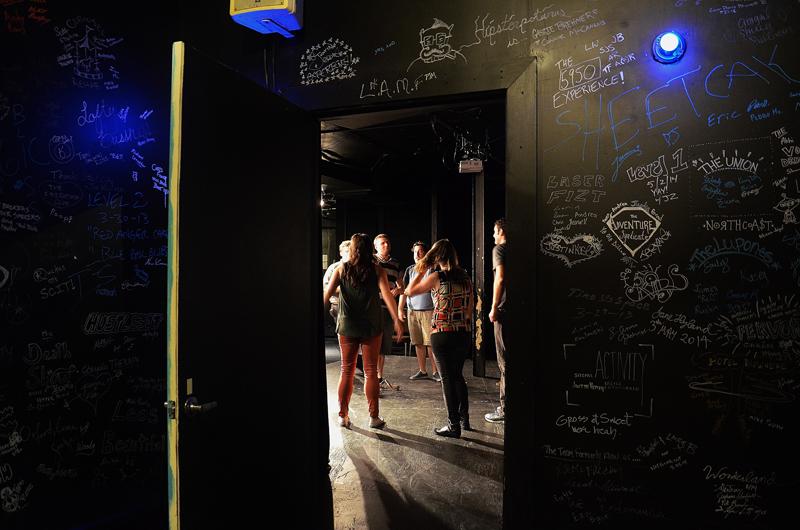When comedian D.J. Kingston wanted to make an improv show about his schizophrenia in 2012, only one theater agreed to stage it.
That host, then known as Steel City Improv Theatre, was famous for its comedy lessons, improv team and saying yes to even the wildest ideas.
The theater, which opened in the North Side in 2011, moved to the East End in 2012, uprooting and taking its unrelenting enthusiasm to an unassuming residential space in Shadyside, where owner Kasey Daley changed the name and kept the free spirit.
“We decided to change our name to The Maker Theater for a couple of reasons,” said Daley.
Apart from doing less improv comedy than the SCIT and putting on more original theatrical plays and co-productions with other companies, “we just want people to make stuff. And [the Maker] is set up for people to do that,” Daley said.
The Maker is one of very few theaters in Pittsburgh that works with “anybody”— play companies, playwrights or anyone else who walks in the door with a semi-reasonable idea for the one-stage venue. Helped by interns, Daley and the art director Mara Nadolski are the only full-time office employees.
Unlike other venues, the Maker takes care of everything from the box office to house management.
“All you have to do is come in and do your show,” Daley said. “You don’t have to worry about any of this other crap that, when you’re creating a show, is just a distraction.”
The Maker Theater, which has only 99 seats, is an intimate space that remembers its own. The names of every group that has ever performed there are scrawled in white ink on a wall in the dressing room, most of whom Daley remembers. She smiles as she picks one out of the hundred or so signatures, a comedy duo named Tragic Bliss who was one of the Maker’s first performers.
“I remember they didn’t have a poster [for their show],” she said, “and so I just drew them [one].”
Daley’s approval policy hardly includes the word no, especially when concerning ideas that are creatively provocative, like Kingston’s “Schizophrenia: The Musical.”
Improvised bells and acoustic strums accompanied the 45-minute sketch show, which featured six improv comics, including Kingston himself, who gave monologues representing scattered thought patterns.
Kingston, a Point Park University graduate, said he discovered the theater group one night in 2011 after seeing a flyer advertising its opening on a bathroom wall after doing a campus stand-up show. Curious, he sought it out and ended up performing improv comedy in the North Side theater. He followed the group to the East End in 2012 when it became the Maker, where he performed the next four years before moving to Chicago this past May. Steel City Improv continues at The Maker today, with a membership of over 80 performers.
“I could say ‘I want to try this,’ and [Kasey] would be all for it,” Kingston said. “And I was always welcome to do anything. At other places, it seems, I wasn’t welcomed in as much.”
Daley is drawn to the bizarre and unorthodox. Her upcoming November co-production with Black Cat Production Company, “The Scarlet Cabaret,” immerses the audience in a “creepy,” “sexy” and “fetish-y” ’40s-style variety show with live music.
“You can do ‘Death of a Salesman’ again and again until you’re blue in the face,” she said. “Most people have seen it. I want to do something that no one has seen. I want people to leave and feel like they’ve had an experience.”
Daley and art director Mara Nadolski’s open-mindedness drives the Maker’s unconventional bill, but there is always the need to sell tickets. The theater is a pending 501c3 nonprofit organization, meaning any grant that the Maker receives comes through its fiscal sponsorship with New Sun Rising, an incubator for new innovative projects in Pittsburgh.
Until it becomes a certified nonprofit organization — when it will be elgible to receive grants from other organizations — Daley said she will have to continue paying for whatever the classes and shows’ revenue doesn’t cover.
“Absolutely everything right now comes out of my pocket,” Daley said in an email, “marketing, salaries, everything.”
To Brett Sullivan Santry, co-founder of Pittsburgh Classic Players, the Maker’s unyielding experimentation depicts an exciting future for smaller Pittsburgh venues.
“That’s where the spark of future possibilities for theater shine the brightest,” Santry said. “When you have theaters that are willing and eager to further their endeavors [and] not just make sure it can be a profit-generating institution.”
Santry, who is putting on a production of Macbeth at The Maker in December, said much of the the Maker’s influence lies in its instructive classes.
In step with its shift away from comedy, the Maker will begin offering theater classes to give people a “practical education” of the theater business, such as how to properly prepare and submit resumés.
“A lot of [theater majors] stay [in Pittsburgh] and start auditioning, and they don’t know why they’re not getting the part,” said Daley, who received numerous resumés from theater students for “The Scarlet Cabaret” that weren’t stapled or put in the right order.
“This is like real 101 stuff,” she said. “Those [are the] sort of practical skills that you need.”
Daley also hopes the classes will help students build a network within the industry in order to give them more opportunities with local theaters.
“People just need an opportunity and a place to start,” she said, “and that’s what we do.”


